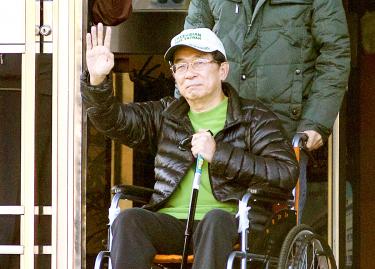Ailing former president Chen Shui-bian (陳水扁) was released from prison on medical parole yesterday, after serving six years for a graft conviction relating to his presidency.
Chen, in a wheelchair and holding a cane, left the prison accompanied by his son, Chen Chih-chung (陳致中), for a month of medical treatment. He waved to a group of supporters waiting outside before boarding a car arranged by prison authorities to take him to his home in Greater Kaohsiung.
As his motorcade — led by police motorcycles — left the prison, some supporters shouted: “A-bian (陳水扁) is not guilty,” and “Go, A-bian,” using the former president’s nickname.
The motorcade navigated throngs of supporters and reporters outside the prison for 10 minutes before breaking free and heading on its way.
Earlier yesterday, a 10-member review panel at the Ministry of Justice’s Agency of Corrections decided to grant the parole in the light of recommendations from a team of doctors who reported a rapid deterioration of Chen Shui-bian’s health since May last year, Deputy Minister of Justice Chen Ming-tang (陳明堂) said.
“His health conditions are complicated and difficult to control. He could die at any time,” Chen Ming-tang said.
In a statement, the agency cited the medical team’s report, saying that the 64-year-old is experiencing loss of motor control.
“This type of degeneration occurs in different parts of the brain simultaneously,” it said.
It added that although Chen Shui-bian was being treated by a team of doctors from Taichung Veterans General Hospital, he has not shown any obvious improvement, except for with his sleep apnea.
After careful observation, the medical specialists reported that Chen Shui-bian’s prison environment did not help his health and would lead to worsening illness, the agency said.
The physicians concluded that confinement had seriously affected his health and recommended that he be sent home for care on medical parole, the agency said.
It stressed that the parole is a temporary release on medical grounds and that Chen Shui-bian is required to return to prison once his health stabilizes.
“The parole period will not count toward his prison term,” the agency added.
Taipei Mayor Ko Wen-je (柯文哲), who is also the convener of Chen Shui-bian’s healthcare working group, yesterday called the latter’s release “just the beginning,” given the substantial work ahead in designing a healthcare plan for the veteran politician.
“His going home is not as easy as it looks,” Ko said. “Thought has to be put into his environment and care.”
He gave as an example the need to protect Chen Shui-bian from accidental falls after he gets home.
Ko also expressed support for efforts to curtail the ministry’s power to rule on medical parole cases.
“Chen Shui-bian’s case has shown us that there are no clear rules on the conditions under which prisoners are to be released to receive medical care,” Ko said. “Allowing prison wardens or the Ministry of Justice to unilaterally decide is not ideal, in my opinion.”
Chen Shui-bian was transferred to a prison hospital in April last year after being diagnosed with severe depression, suspected Parkinson’s disease and other conditions.
He attempted to commit suicide in June last year, trying to hang himself with a towel in a prison hospital bathroom, officials said.
Chen Shui-bian’s supporters have recently stepped up their campaign for his early release.
His former deputy, former vice president Annette Lu (呂秀蓮), 70, undertook a three-day hunger strike in a tent late last month to demand that he be freed.
The former Democratic Progressive Party leader ended 50 years of continuous Chinese Nationalist Party (KMT) rule when he came to power in 2000.
After his second term ended in 2008, Chen Shui-bian was sentenced to life in prison in 2009 for money laundering and bribery — a term reduced to 20 years after appeals.
He began serving his sentence on Nov. 11, 2010, but had been detained for nearly two years by then, while prosecutors were investigating and prosecuting the cases.
Chen Shui-bian insists that the charges against him are part of a politically motivated vendetta by the current KMT government in retaliation for his eight years in power promoting Taiwan’s independence.
Additional reporting by Abraham Gerber
Source: Taipei Times - 2015/01/06





















